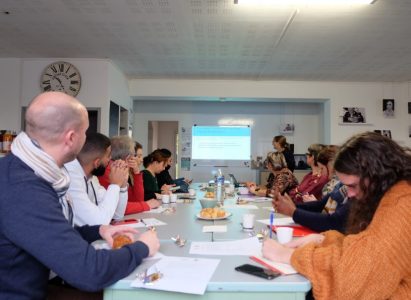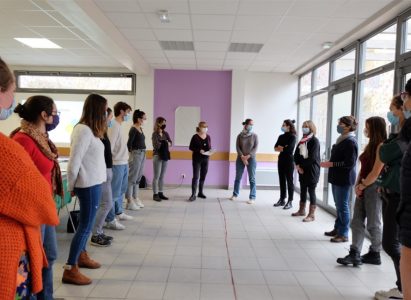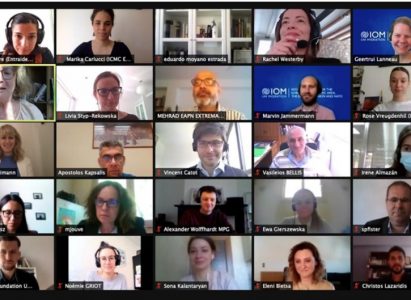Share SIRA’s – Strengthening and Expanding Social Orientation and Integration for Newcomers in Rural Areas across the EU

Building Inclusive Rural Territories for Newcomers
Rural areas are emerging as key partners and actors in the integration and resettlement of refugees and migrants across the European Union. The increased migrant and refugee arrivals in the EU since 2015 required policy responses that have expanded the involvement of rural and smaller communities. Due to national policies to distribute refugees and migrants more evenly across regions as well as by contributing contributions to joint EU resettlement and relocation initiatives, rural areas are increasingly receiving and supporting third country nationals. Rural areas can offer a welcoming environment for those having fled violence, and are also home to a large number of migrant workers responding to the ongoing demand of the agricultural industry and other rural employment sectors.
While rural areas are playing an increasingly important role in receiving newcomers from third countries, actors often lack the experience, capacity, and knowledge to effectively meet newcomers’ orientation and integration needs. At the same time, the experiences of rural and smaller communities as integration actors means there now is growing evidence to inform successful and effective approaches and practice in this area. In this context, the Share network supports local and regional stakeholders in sharing best practices and through carrying out targeted research on successful and effective locality-based approaches for integration. We collaborate with communities, offering training and capacity-building and amplifying stakeholders’ voices.
In short, at Share, we believe that rural areas can provide opportunities for newcomers and that migrants and refugees can actively contribute to the long-term positive transformation of rural areas and communities. Through the SIRA project, we work towards fostering inclusive and territorial approaches, based on bottom-up solutions and multi-stakeholder partnerships for integration in rural communities in the EU.
As our past research has highlighted, rural areas have enormous potential to offer for newcomers, in particular labour market opportunities, welcoming host communities, adequate housing, and children’s education. Yet, newcomers face specific challenges upon their arrival in Europe, such as access to mainstream services and education, access to language courses, finding appropriate housing, building social and professional networks, becoming familiar with participating in communal activities, and getting a sense of belonging in their new environment.
Introducing Share and the SIRA project
Established in March 2012 and led by the International Catholic Migration Commission (ICMC) Europe, the Share Network provides a platform for mutual exchange and learning among regional and local actors from across Europe to foster welcome, inclusion and integration of newly arrived migrants and refugees. We facilitate transnational exchange, conduct research, and map best practices to bring voices from the ground to the national and European policy levels. In doing so, we adopt a whole-of-society approach involving the local communities including refugees and migrants as stakeholders with unique expertise and invaluable agency.
The Share SIRA project, running from January 2021 to December 2022 and co-funded by the European Union’s Asylum, Migration and Integration Fund, seeks to strengthen and expand the orientation and overall integration of third country nationals in rural areas. In this contribution, we invite you to discover some aspects of our work in the ten rural regions in France, Greece, Poland, and Spain of the Share SIRA project. Led by ICMC Europe, the project is implemented in cooperation with IOM Regional Office in Belgium, ANKA in Greece, Entraide Pierre Valdo in France, IOM Poland, IOM Spain and Fundación Cepaim in Spain.
Promoting Multi-stakeholder & Multi-level Cooperation
As rural communities and areas have become testing grounds for new practices and approaches regarding refugee and migrant inclusion, developing multi-stakeholder platforms between national, local administrations, civil society and citizens and the private sector to effectively respond to the needs of newcomers has proven to be key.
In each region of the SIRA project, multi-stakeholder cooperation platforms were established in order to design and implement coherent and inclusive territorial approaches for orientation and integration. These regional roundtables meet four times during the course of the project and engage a wide range of actors reaching from regional and local authorities or agencies via mainstream service providers (social services, health, education) and public employment bodies to political representatives, community associations, volunteers and migrants and refugees themselves. Over 465 local and regional stakeholders have participated in these roundtables.
The platforms can ensure coordination between all relevant actors to adequately meet newcomers’ needs. An example of particularly successful coordination is the latest platform in Mazovia, Poland, where around 90 stakeholders, including many municipalities surrounding Warsaw, joined to receive first-hand information on legal requirements for the reception of Ukrainian refugees and inform each other on needs and reception capacities.
The cooperation platforms have mapped ongoing integration initiatives for newcomers, assessed existing integration strategies and policies, and identified challenges and gaps in each region. The data collected has been comprised into ten factfiles available in English and in the original languages of each region (French, Spanish, Greek, or Polish). The project also confirmed that integration actors in small and rural communities need training and capacity-building, which Share SIRA seeks to provide. SIRA partners assessed the capacity building needs of regional platform stakeholders during the roundtables and developed a unique programme to meet the needs of each regional platform. The trainings conducted between October 2021 and February 2022 were very successful; participants requested further trainings.
Photos of the trainings

(Saône-et-Loire, France). Credits : Entraide Pierre Valdo

(Isère, France). Credits : Entraide Pierre Valdo
After the first year of the project, we have drawn some preliminary conclusions on the conditions for successful regional multi-actor coordination. It is essential to start not only by mapping relevant actors and conducting a territorial analysis, but also with a concrete objective linked to practical needs and responding to challenges. We asked ourselves “What is the objective of the platform?” to tailor activities more effectively. Multi-stakeholder engagement is a long-term process and must be designed for the long run, with funding in place and various stakeholders involved and recognised as legitimate and neutral by other actors. Stakeholder outreach in rural areas requires considerable time and effort because rural actors are often scattered across a region, are less numerous and have less staff capacity and time than their urban counterparts.
We have also noted that there is a lack of coordination of integration actors in certain areas. Several networks can co-exist in the same region with varying degrees of formality. It is a particular challenge to bring actors working with different groups of beneficiaries (asylum seekers, refugees and migrants) together. They tend to lack a common agenda and work in isolation. Similarly, those financed by the state to provide services to refugees and those engaging independently in advocacy and action for legal status acquisition and decent living conditions might not coordinate their activities very well. There is a strong need for increased cooperation between different stakeholders. A multi-stakeholder and inclusive approach is key to ensuring the participation of all relevant integration actors in rural areas.
Piloting and Assessing Place-Based Approaches & Solutions
At the core of the SIRA project are ten pilot actions, each implemented during 10 months in a different European rural region. These were selected by the SIRA partners after an initial assessment of the regional contexts and potential solutions, as innovative ways to address common challenges that newcomers face when settling into life in a rural community. Therefore, the ten pilot actions seek to strengthen the integration of newcomers in numerous ways, such as combatting geographical and social isolation, providing access to language learning services, employment and health services, and ensuring participation in local social and cultural activities. Furthermore, local communities are at the centre of these initiatives, as mutual understanding and opportunities for positive encounters between migrants and local communities are an essential element of successful integration. Launched at the end of 2021, the ten-month pilot actions are accompanied and supported by a different partner in each country, and monitored by an external evaluator. A final evaluation will be conducted in the summer of 2022 and the key findings from the evaluation will inform Share SIRA’s advocacy work. To learn more about the pilot actions check out each region on the map here.
Supporting Evidence-Based Policy Making
At the Share Network, we advocate for policymaking guided by evidence gathered from and in collaboration with local communities. We believe that through data collection and information sharing the experiences of local communities, including refugees and migrants themselves, can influence the development of better integration policies and practices at all levels of governance. We conduct targeted research and continuously collect feedback from project partners to effectively map and promote best practices. Through transnational exchange and learning activities, capacity-building activities, and the design of tools and resources, the SIRA project ensures experiences and best practices are shared among local, regional, national, and European stakeholders.
Building upon previous work of the Share network, a Share SIRA Expert Group has been set up. It brings together representatives from EU institutions as well as national, regional and local authorities, international organisations, academia and think tanks, and migrant-led and other networks. The expert participants provide inputs over the course of four meetings, each addressing a specific thematic area. The discussions and conclusions from these meetings inform the production of four thematic policy briefs. After a first meeting in May 2021 on the impacts of the Covid19 pandemic on integration in rural areas and a second one in December 2021 on the participation of migrants and refugees in designing and governing rural integration action, the latest Expert Group meeting in March 2022 dealt with rural actors’ access to EU funding for integration activities.

(First online Expert Group Meeting, held in May 2021). Credits: ICMC Europe/Share network
Prior to the latest meeting, the Share Network and IOM Regional Office in Brussels conducted a survey on the challenges and practices in access to EU funds. The main findings were shared with the experts at the meeting, including the fact that only half of the participants had accessed EU funds or that just one out of five participants had been consulted by national/regional managing authorities in the design of funding programmes. The results also confirmed that integration projects in rural areas need EU funding as only 10% of our participants stated to have sufficient alternative sources of funding (national, regional, local). However, deterrent barriers prevent local stakeholders from accessing the funds: bureaucratic hurdles, low flexibility of funding programmes, insufficient human resources and lack of know-how, or intransparent information flows on EU funding priorities and programmes. The results of the survey as well as the conclusions from the third Expert Group meeting will be available soon on our website.
Informed by the Expert Group meetings and feedback from partners on the ground, the Share SIRA policy briefs are another example of our contribution to evidence-based policymaking. These concise and evidence-based documents are designed to be accessible to a broad range of policymakers and practitioners working across policy domains including refugee and migrant orientation/integration, rural development, and citizen engagement at European, national, regional, and local levels. In our latest policy brief, we propose an Inclusive Territories approach to guide the participation of rural areas and communities as integration actors. The brief taps into a political momentum, as integration and the future development of rural areas are at the heart of several major EU policy initiatives launched in 2020-21, such as the Action Plan on Integration and Inclusion 2021-2027, the long-term vision for the EU’s Rural Areas up to 2040 and the Territorial Agenda 2030.
Ensuring Migrant and Refugee Participation
Another fundamental pillar of Share’s work is the participation of those actors primarily concerned. We advocate for the inclusion of newcomers and local actors in designing, implementing, evaluating, and advocating for welcome and integration policies. We champion co-creation and bottom-up collaboration throughout the network and develop partnerships and capacities to promote ownership by regional and local communities. Rather than being providers and beneficiaries of integration services, newcomers and local actors are co-beneficiaries from integration action. Both also are stakeholders with invaluable expertise from lived experience. Taken together, their voices and our facilitation can foster positive exchanges, improve mutual understanding and strengthen social ties between newcomers and local receiving communities.
Have a look at our series of articles “Mayors in the Spotlight” celebrating and showcasing the leadership of local mayors in smaller and rural municipalities from across Europe. These people pave the way to a more welcoming continent. We had, for example, the opportunity to speak with the mayor of Tardelcuende, a small rural municipality in the Spanish province of Soria, whose strategy to attract migrant workers to town has helped to counteract the trend of demographic decline and an ageing population.
We also launched the Rural Ambassadors for Inclusive Territories Programme in France in September 2021. Our ambassadors are refugees and local elected representatives of small and medium-size communities who have first-hand experience on the process of inclusion and integration of newcomers. The aim is to encourage the recognition of newcomers as agents of rural revitalisation and to understand that migration is part of the solution to the many challenges affecting rural areas.
On 5 October, our youngest ambassadors, Khmlin and Maher, spoke at the MPI event “Social Innovation for Refugee Inclusion (SI4RI): Sowing Innovation in the Cracks of Crisis”. He took the opportunity to share his insights on good practices for welcome and integration in rural communities, and advocate for more and better integration actions.
Ensuring migrant and refugee participation is an ongoing priority area for the Share Network, and requires time and consistent efforts. Since many migrants and refugees face digital barriers (lack of equipment or digital skills) and there are fewer migrants in rural areas, extensive outreach efforts and flexibility to accommodate their schedules is necessary. Participation is a long-term process, and the time available to refugees and migrants is limited. It is important to take account of constraints, obligations and priorities. Our next policy brief on migrant and refugee participation is to be published soon.
Stay tuned
To conclude, we believe that local communities are at the heart of creating welcoming environments in which newcomers can settle and thrive. In line with this belief, the Share SIRA project seeks to promote multi-stakeholder engagement and provide opportunities for capacity building to actors from local, regional, national, and European levels. We facilitate transnational exchange to share tools, resources, and best practices in order to assess, implement, and strengthen inclusive territorial approaches to integration. We pilot and evaluate new and innovative approaches to rural integration that involve both local communities and newcomers.
More events directed towards external participants are to come, such as our final conference in Brussels in November 2022. You can subscribe to our newsletter here to be updated on upcoming events and insights from the Share network.

